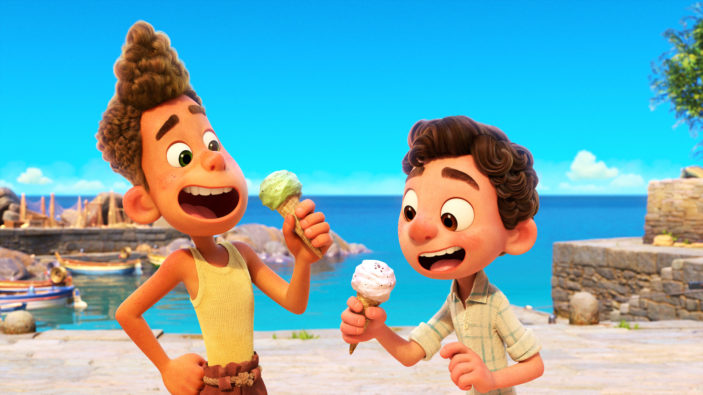
On the surface Luca appears to be one of the more slight Pixar entrants. A studio that is known for its near-perfect track record, there’s a certain narrative around the brand that seems to paint any of their films that doesn’t quite reach the emotional highs of an Up or an Inside Out as a second-tier title.
Yes, Luca may appear to aim for a more modest canvas as a tale as little more than two sea monsters masquerading as humans in a coastal post-war Italian village, the dream of owning their own Vespa the extent of their determination. Had this been director Enrico Casarosa‘s M.O. we’d have a fine, simplistic tale on our hands, one that lovingly leans into an underdog temperament that laces the film with an accessibility.
Examining the film’s subtext, however, reveals a far more bold narrative strategy, one that frames itself around the idea of first love between two adolescent boys. Of course, this being a Pixar film and Pixar being under the Disney banner means it’s a theme that isn’t addressed head on. The House of Mouse have had “their first openly gay character” allegedly represented across a multitude of their films now – if it wasn’t Josh Gad in Beauty & the Beast, it’s Jack Whitehall in the upcoming Jungle Cruise, presuming John McCrea in Cruella didn’t get their first – and though Luca technically avoids this narrative, it handles the topic with far more sensitivity.
The first love blossoming is between the titular Luca (voiced by Jacob Tremblay) and Alberto (Jack Dylan Grazer), two sea monsters who brave the land by exiting their oceanic safe haven and take to the physical streets of Portorosso, a small Italian community, manifesting into human form upon vacating the water. Luca is more cautious of this venture, having being repeatedly told by his over-protective mother (Maya Rudolph) and father (Jim Gaffigan) of the dangers of the land, whilst Alberto’s free spirit harbours a no-fear mentality, something that excites Luca.
When the duo start building their own Vespa a kindredness strikes between them, and the lush visuals accompanying these sweet-natured montages of them practicing (and failing) with their makeshift vehicles only strengthens the thematics surrounding the notion that the two boys are essentially falling in love with one another; these themes only nourished further by the allegory that sea monsters having to hide their true form in the shape of a human is a comment on gay people conforming to be accepted.
Of course, there will be those that could possibly dismiss Luca thinking its thematic subtext will be too overpowering. On the lightest of glances, and that’s all kids are really going to give this film, it’s a beautifully presented family outing about two boys and their desire to win a Vespa. It’s simplistic and harmless and plays into the buddy comedy mentality that so many other films have adhered to with success. Luca is charming and often very funny (look out for the moustached cat) and that should prove satisfactory to families who, perhaps, aren’t ready to approach what this film seems to truly be addressing.
A deeper relationship than that of Buzz and Woody from Toy Story or Mike and Sully in Monsters Inc., Luca and Alberto are undeniably romantically connected, but, knowing their target audience, Pixar have at least constructed it in a way that isn’t going to ruffle too many feathers. It’s a love story at its core, and though Pixar could absolutely push this mentality a bit further, the fact that it’s a film that celebrates someone’s differences is more than enough to deem Luca beyond a second-tier title.
![]()
![]()
![]()
![]()
![]()
FOUR STARS (OUT OF FIVE)
Luca is available to stream on Disney+ from June 18th, 2020.
